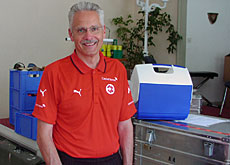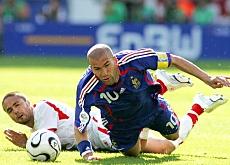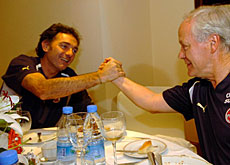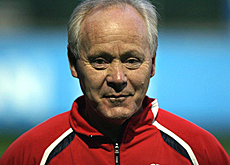Doctor plays vital role in Swiss World Cup bid

In the final analysis the players will decide Switzerland's success or failure in the World Cup, but team doctor Roland Grossen acts as an important adviser.
Grossen spoke to swissinfo about the pressures and demands of keeping the squad fit and running in the hothouse atmosphere of the tournament.
He and his two assistants were kept busy during Switzerland’s opener against France, but their work started well before Tuesday’s match in Stuttgart.
Coach Köbi Kuhn relies on Grossen’s expertise and advice as he attempts to plot a course for victory in Germany.
swissinfo: What type of working relationship do you have with the players?
Dr Roland Grossen: All the players trust the medical staff and that is very important. We are there to give advice to player who wants it. Even though some are young, they know their bodies well and realise how important it is to keep in condition.
We have been living together for three weeks and we speak about other things than football. The World Cup is a wonderful occasion to get to know each other and the relationship between doctor and patient is vital for giving the best possible treatment.
swissinfo: Who makes the final decision on whether a player can play or not?
R.G.: I give my opinion about injuries, the player’s potential to shake it off and the risks of recurrence. But the coach always trainer makes the final decision and it is best that way.
The medical staff do not have a monopoly on information. Mr Kuhn also seeks feedback from the players themselves.
swissinfo: How do you manage to do an effective job during an emotional match?
R.G.: I am as much caught up by the emotion and atmosphere of the World Cup as anyone else, but as soon as the game begins I forget about the importance of the result and look at the game through eyes of a doctor.
I try to be constantly vigilant and to anticipate an accident before it happens. It is important to predict what kind of injury it could be because during game I don’t have time to diagnose.
The player can be in a lot of pain and the referee is behind you asking you to leave the field. I have to take decisions very quickly in these cases because the team can’t play for long with 10 players.
swissinfo: How did things go during the game against France? [Ludovic Magnin and Philipp Degen were the worst casualties]
R.G.: I knew that Magnin’s injury was a twist and Degen’s was caused by a knock. When I arrived I asked them if they had turned badly or if they had taken a crack. I then manipulated the injured part to test the pain and the stability of the joint.
In most cases a player knows full well if he can continue or not, but sometimes I have to take time off the field to properly evaluate so the team does not have to make an unnecessary substitution.
swissinfo: How well prepared are the players physically?
R.G.: They all play at high level, they are the Formula 1 of football, and their bodies are constantly under stress from collisions and exercise. You have to keep fine-tuning all the parts of the body like an engine.
The medical team started planning as soon as Switzerland qualified in Turkey. We were in contact every week with the players and their clubs. When [Philippe] Senderos hurt his knee [playing for Arsenal] we travelled to England. This is not because we don’t trust our English colleagues but we needed to know exactly how the injury would develop.
swissinfo-interview: Mathias Froidevaux and Matthew Allen
Roland Grossen was born on August 10, 1949 in Neuchâtel. He has been a general practitioner for 26 years – 20 of them with the Swiss Football Association.
He was formerly youth team doctor, but has been senior team physician for the last seven years.
The Swiss medical team also includes assistant doctors Cuno Wetzel and Rudolf Roder plus physiotherapists Christian Meissgeier, Daniel Griesser and Stephan Meyer.
Switzerland’s worst casualties so far have been Johan Vonlanthen, who was forced to withdraw from the squad with a torn hamstring, and Valon Behrami, who is struggling with a groin injury.
In the match against France in Stuttgart on Tuesday, the players lost between two and four kilos in body weight in temperatures topping 30 degrees. They wore special ice vests and drank fluids with mineral salts at half time to cope with this.

In compliance with the JTI standards
More: SWI swissinfo.ch certified by the Journalism Trust Initiative




You can find an overview of ongoing debates with our journalists here . Please join us!
If you want to start a conversation about a topic raised in this article or want to report factual errors, email us at english@swissinfo.ch.